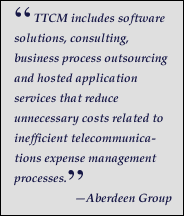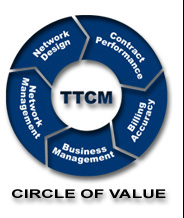




TTCM Savings Area:
Contract Performance
Published In: Volume
3 Issue 6
Date: November,
2004
|
Often, we focus on what content needs to be in a superior telecom contract. But just because you want some language or pricing in a contract doesn't mean you'll get it. Famed negotiator Chester Karras says, "You don't get what you deserve, you get what you negotiate." The strength with which you go into a negotiation has a lot to do with the quality of the deal when you come out. First and foremost, your ability to negotiate successfully is tied to your ability to walk away from the deal, which you can never do if your back is against the wall.
To maximize your strength going into a negotiation, here are a few key early stage tips: Knowledge Is Power: This combination of expertise and information about your needs and the vendor's situation are the most critical elements to tackle before you even get started with them. On your end, be sure you know what services you will be purchasing and at what volumes (both now and in the future), what the most favorable market rates are, and whether you are actually in a position to switch vendors, to name just a few key items. Time and Deadlines: Vendors like to start negotiations as close as possible to when the contract term expires. Make sure that time is in your favor, because time always works against the person who doesn't have it. Start early and set a deadline that allows you to explore other options if you can't reach an acceptable agreement with your vendor (and let them know that is what you intend to do). For a mid to large telecom agreement the starting point might be 6 to 8 months before expiration, with a deadline that leaves 4 to 6 months to explore options. Remember, your true deadline and the negotiating deadline are two different things. Authority Level: Negotiate at the proper authority level, with the person that can say "yes." You don't want to have to negotiate it more than once so refuse to negotiate with someone who doesn't have that authority. Of course, you'll always want to have a higher authority in the wings on your side..... Create Risk: Never let a vendor know that they have the inside track (even if they have) until you have an acceptable contract. Tell the vendor only that they have made it to the short list (they don't need to know how short the list is). If the vendor thinks they are still fighting for your business they will be more willing to accommodate your highlights and redlines.
Analyze The Offer: Everything is negotiable, but everything has a price. Study the offer carefully and identify all changes that you would like to see, then prioritize these changes so you can quickly identify which ones are deal breakers. Also list the items that you are willing to concede to as an act of "good faith negotiations." Try to identify "hairy hand" items. These are items that are inserted to make the deal look more challenging than it really is, and then get negotiated out to win a concession (also known as decoys or red herrings). Remember, quoted prices are invitations to buy, not statements of value. Trade-Offs: Never give a concession without getting a concession. This is the secret to keeping a negotiation balanced. It keeps the other side from nibbling you to death. They know they'll have to give up something for everything they get. This is like splitting the difference. Always Ask: If you want something, ask for it. Good negotiators do not put their best terms on the table first, so you can be sure the vendors have a little room to move. And it doesn't hurt to shoot really high early on, that sets the tone that about your expectations for the outcome.
Set-Asides: When you're deadlocked on an issue, set it aside and come back to it after you've reached agreement on the easier issues. Why leave the toughest issues for last? Because by the end of negotiations, the process has momentum and both sides will have the motivation to be flexible. Going Quiet: If the negotiating table goes silent, people get nervous. Use this to your advantage. Say nothing and wait for the gap to fill with the comments of others. When you are down to the last few key points, call a conference, leave the room, adjourn for a few days, whatever. Just let the other side think. Don't be in a hurry to resume discussion. Let them think you are losing interest. When you do come back, make your points even stronger than before. Blame The Attorney: We're just kidding here (sort of). The truth is that their skin is tough and you can hide behind their demands, especially on language issues. Ace In The Hole: If you've properly run through the negotiation, you likely have a little something in reserve to give away. You might have a little extra volume towards a higher MARC, for example, that you can trade off to get over the hump. Walking Away: This is not a strategy you should ever use as a bluff. When you walk away from a deal, you have to be prepared to move on to your next best option. But if the vendor feels you are in a position where you can use this tactic, even the slightest hint could be useful.
Negotiating is a process, not an event. It takes a lot of practice, a lot of preparation, and a willingness to see a positive outcome for all. A well-done negotiation leaves everyone satisfied, it doesn't send people home angry and frustrated.
©2004,
TelAssess, Inc. All rights reserved. |
![]()
©2004, TelAssess 800.657.1595
Designed by Stylus
Designs

